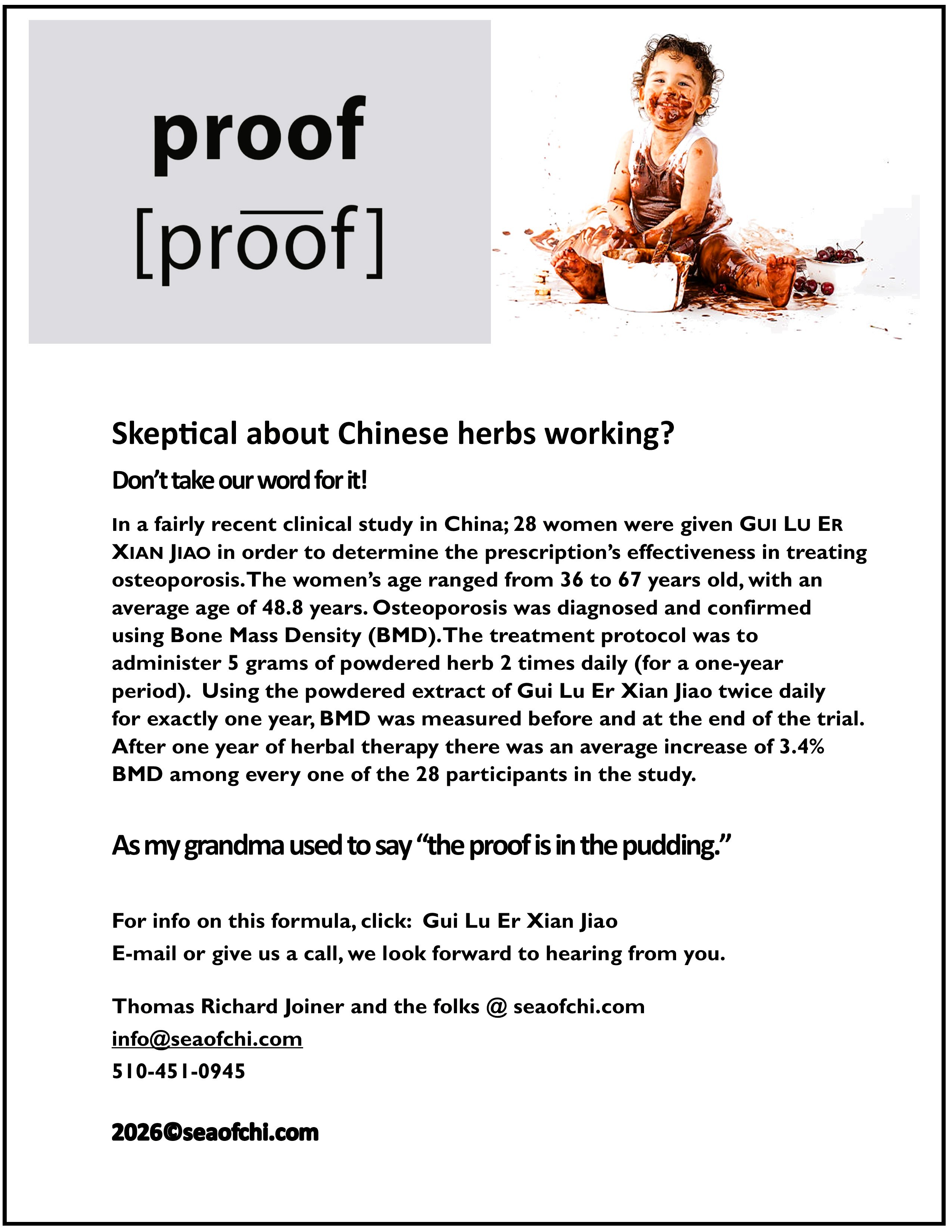Shopping Cart
0 item(s) - $0.00Menstrual Pain Relief, Menopause and PMS Treatment
 Start treatment early and prevent years of pain and discomfort! Traditional Chinese medicine’s approach to insuring gynecological health is to nourish the reproductive organs with herbs that in turn will prevent the symptoms of menopause, menstrual discomfort and PMS symptoms.
Start treatment early and prevent years of pain and discomfort! Traditional Chinese medicine’s approach to insuring gynecological health is to nourish the reproductive organs with herbs that in turn will prevent the symptoms of menopause, menstrual discomfort and PMS symptoms.
预防更年期症状、经期不适和经前综合症症状
What follows are three classifications of menstrual disorders (menorrhagia, dysmenorrhea, and amenorrhea) that are successfully treated with herbal formulas. Customarily, Chinese mothers begin treating their daughters as soon as they enter puberty, and herbal treatment continues until she enters menopause. This will nourish the reproductive organs preventing disease from developing.
- Menorrhagia: Traditional Chinese medicine describes a normal menstrual cycle as one that lasts from 3-5 days, with an average blood loss of approx. two fluid ounces. Anything in excess of that is considered menorrhagia, the clinical term for excessive loss of blood during menstruation. Although excessive menstrual bleeding normally results from an imbalance of the hormones estrogen and progesterone or a physical disorder such as polyps, fibroid tumors, pelvic infections or the use of an IUD, in some women no physical cause can be found. The Chinese herbal formulas listed below should be considered for regulating the period and arresting excessive bleeding. Sufferers of menorrhagia may also want to consider using Chinese blood tonics to improve blood quality, since menorrhagia is a leading cause of pernicious anemia.
- Dysmenorrhea: The use of Chinese herbs to successfully treat many serious female reproductive diseases is well documented, as is their use for treating what is by far the most common female complaint; painful menstruation, clinically known as dysmenorrhea. The mental anguish that develops in anticipation of menstrual pain along with hormonal imbalances is at the root of PMS (premenstrual syndrome). There are two forms of dysmenorrhea: primary and secondary. Most women suffer to some degree primary dysmenorrhea, which creates discomfort ranging from mild to severe pain and suffering. A long list of accompanying symptoms includes migraine headaches, bloating, lower abdominal pain (cramps), severe blood loss, anemia and fatigue. Secondary dysmenorrhea is due to an underlying disorder such as endometriosis (a condition in which fragments of the lining of the uterus are found in other parts of the pelvic cavity), ovarian cysts, or pelvic inflammatory disease.Traditional Chinese medicine treats primary dysmenorrhea with herbal blood tonics, which contain herbs that eliminate the blood clots that cause the cramps by thinning and cooling the blood. Other herbs in the blood-tonic formulas improve circulation, resolve anemia (which results from monthly blood loss), and regulate the menstrual cycle—which means controlling the duration of the period to no fewer than three and no more than five days. In cases of secondary dysmenorrhea, the underlying disorder must be correct first before blood tonics can be effectively used.
- Amenorrhea: Although Chinese herbal therapy has proven to be very effective for treating amenorrhea (cessation of the menstrual period), the process of initiating menstruation has been shown to be somewhat slower when herbs are used exclusively. Therefore, acupuncture is highly recommended to “jump-start” the menstrual period, followed by herbal therapy to regulate it. Of the two kinds of amenorrhea—primary and secondary—primary amenorrhea (which is delay of puberty or failure to begin menstruating by age sixteen) is the more complicated. The delay of the onset of puberty may be natural, it may result from endocrine disorders, or in rare cases it can be caused by Turner’s syndrome (missing one female chromosome). The most common cause of secondary amenorrhea is pregnancy. Other than that, periods may temporarily cease after a women has stopped taking birth control pills. Other possible causes are emotional stress, depression, anemia, anorexia nervosa, excessive physical training, and the use of drugs. Disorders of the ovaries such as polycystic ovary or a tumor such as those found in ovarian cancer are other possible causes. Amenorrhea occurs permanently after menopause or after a hysterectomy (surgical removal of the uterus).
Traditional Chinese medicine studies show that Chinese women overall have an easier time with menstrual and lifecycle changes than those in the US. Why? Scientists believe that the higher intake of isoflavones (soy products) and the use of Chinese herbs are contributing factors, which have resulted in a population with lower rates of breast cancer, uterine cancer, & osteoporosis, along with a significant reduction in unpleasant menstrual and menopausal symptoms. All of the below formulas are used for relief from an acute pain and discomfort, for best results long-term use is highly recommended. However, if you are in any way confused about which formula best suits your needs please give us a call.

All Rights Reserved | © Sea of Chi 2026 | Web Design Company - DreamCo Design
The statements made have not been evaluated by FDA. Our products are not intended to diagnose, treat, cure or prevent any disease.
















